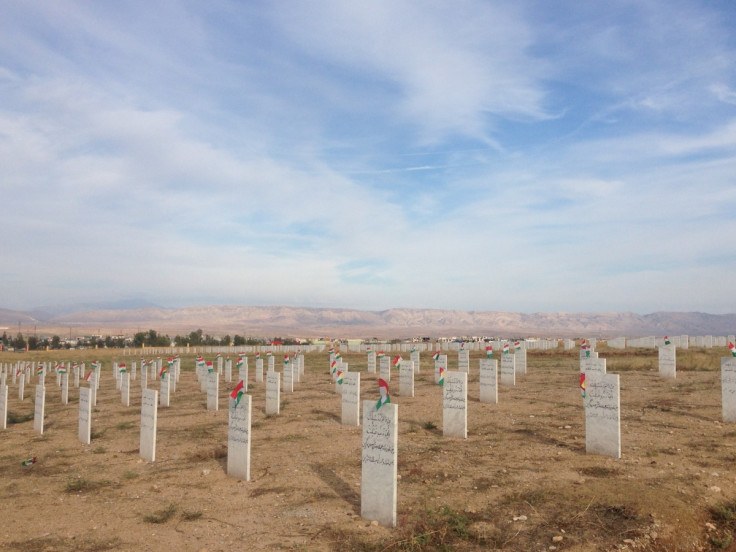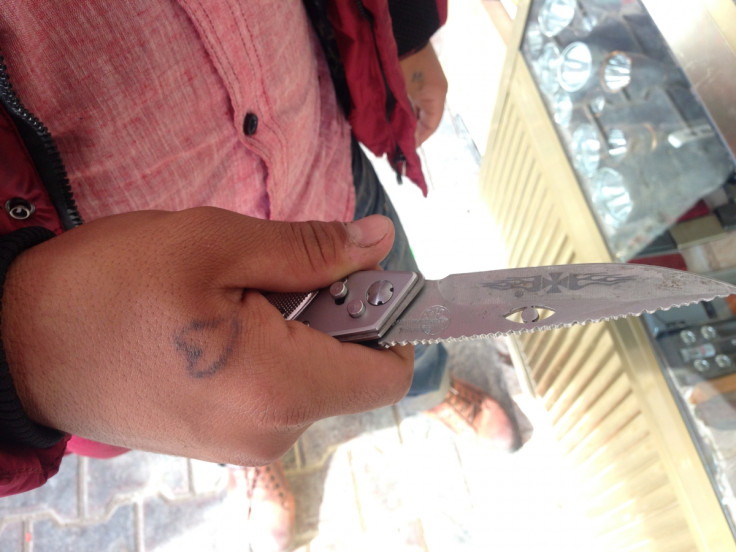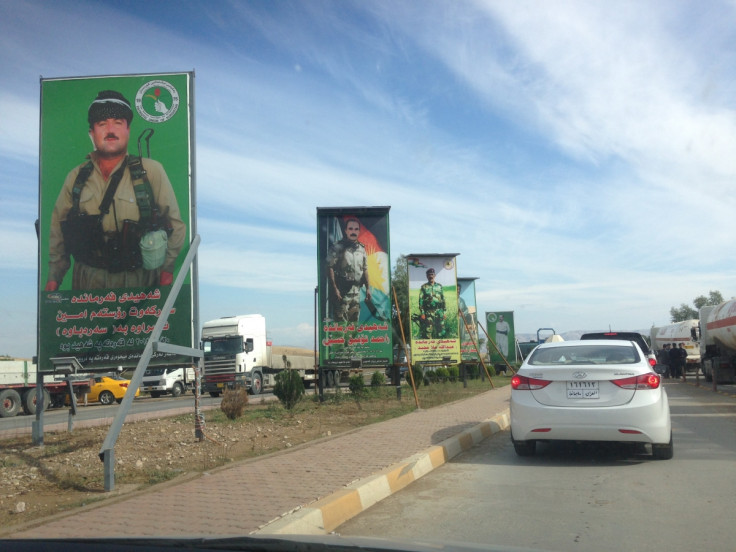Iraq: Inside the scary, gun-toting, Isis-hating Iraqi Kurdish town you've never heard of

Posters line the road at a security checkpoint outside town showing the mustachioed faces of local fighters killed in battle with Islamic State (Isis). Nearby lies a cemetery in which 838 Kurds killed by Saddam Hussein's henchmen are buried. There used to be a speed camera on this dusty highway too, but, according to local lore, disgruntled local drivers shot it out so many times that the authorities gave up replacing it.
Welcome to Chemchemal: The most macho, gun-toting, IS-hating Iraqi Kurdish town you've never heard of. On the road between the Kurdistan Regional Government's capital, Erbil, and its second city, Sulaymaniyah, Chemchemal has a notorious reputation as the most lawless, heavily armed town in the region. Kurds from elsewhere say they're crazy. Chemchemalis say they're angry. And right now, the only thing they hate more than the government is IS.
Everyone in Chemchemal is so crazy. Everyone has a gun. If you have a problem with them, you will be killed
The issue of unpaid government salaries is what currently has them riled, but the discontent runs deeper, with the town still reeling from the damage done during Saddam Hussein's genocidal Anfal campaign of the 1980s and the subsequent failure to develop economically. And when the town is seen as a microcosm for the region, the picture is alarming. If its grievances aren't addressed, this tinderbox town could threaten the stability of the West's most crucial ally in the war against IS.
While taxi drivers plying the road between Erbil and Sulaymaniyah trade jokes about Chemchemalis ("If someone from Chemchemal says: 'F**k you,' you say: 'Thank you,'" goes one), others insist that the violent nature of the town is no laughing matter. "Everyone in Chemchemal is so crazy," says Hawre Khalid, a local journalist who grew up in the town. "Everyone has a gun. They're good people, but if you have a problem with them, you will be killed."
It's no idle boast. In one wave of killings in 2010, local residents reported 17 murders in 20 days after a vicious inter-tribal vendetta spiralled out of control. The KRG was forced to send in 150 heavily armed troops in armoured vehicles from outside the town to quell the violence.
The head of Chemchemal's Asayish security services, Ahmed Nader Qadr, says those days are firmly in the past, but residents say the town's name remains tarnished. Rekar, 18, sells clothes from a cart in one of the main streets. "If you say you are from Chemchemal, people expect you to fight," he says. "If you don't, you feel ashamed." And all men carry a weapon, he says. Rekar shows off the flick knife he carries "for protection" but says he is saving up for a gun.

The reputation for bellicosity extends to Chemchemal's commitment to fighting Isis. The town even has a volunteer Peshmerga brigade that heads to the front whenever they catch wind of an offensive. "When there's fighting, people from here go to fight – they volunteer," says head of security Qadr. Given the population of about 120,000, the 60 Peshmerga from Chemchemal killed in battle against Isis is a wildly disproportionate figure, he says. "It's fair to say this is the most Isis-hating place in Kurdistan."
But lately residents have been nearly as angry with the government. The merchants at the town's gun bazaar are happy to explain why. Khalid sits surrounded by the paraphernalia of war, his cart piled high with ammunition and festooned with bandoliers. "Business is zero," says the Peshmerga veteran of 12 years. "Our customers are mostly Peshmerga but they haven't been paid their salaries in months. Guys are coming here and selling their equipment, so they can feed their families."
The Kurdistan Regional Government (KRG) is facing a double squeeze of fighting a war, while also fighting the federal government in Baghdad over the right to export oil independently. Baghdad has stopped paying the region its share of the budget, and independent oil sales have not made up the difference. With public sector wages making up over 70% of the KRG's budget, payments have fallen months behind.
"I'm angry, but others are more angry," Khalid says. "At least I can earn something on the side here, even if it's not much."
In October, frustration boiled over. Unpaid municipal workers went on strike and garbage piled up on pavements. Protesters furious with the ruling Kurdistan Democratic Party (KDP) took to the streets. And the town mayor was there with them.
"The people are angry at Erbil," says Amanj Kasas Jabari from his municipal office. "Me and my staff went out with them when they protested. They have their rights; they're not getting paid their salaries."
The manager of a local logistics company said he looked into opening a depot in Chemchemal but was dismayed by the number of people he was expected to pay off first.
The room is filled with a dozen men awaiting an audience with the mayor. The older men wear traditional Kurdish clothing – baggy trousers, a tunic and a wound sash – and twirl worry beads, while the younger men dress in Western style and play with their smartphones. A couple carry side-arms on their belts. Jabari estimates he sees between 400 and 450 of his constituents every day. "That's not including the 200 missed calls on my phones," he says.
As such, he is well placed to speak of their grievances. "They come to me looking for help," he says, signing a sheaf of papers thrust in front of him. "This is my real job, to listen to people and try and solve their problems."

Water shortages are a big problem."Some people are going for two weeks without water. It's a crisis," he says. Salaries too are obviously high on the agenda. The underlying issue though is the lack of development: "It's half what it is in other areas of Kurdistan."
The town sits atop one of the largest gas fields in Kurdistan, but this hasn't benefited the local area much as it should do. Jabari says: "That money goes straight into the KRG's budget, so we don't see it."
The town's reputation for lawlessness and corruption hasn't helped it attract investment either. The manager of a local logistics company said he looked into opening a depot in Chemchemal but was dismayed by the number of people he was expected to pay off first. Eventually the company decided to look elsewhere.
Jabari blames the town's past for its current woes. "The worst atrocities of the Anfal campaign occurred here," he says. "People lost their shops, their homes, their families – everything. The economy still hasn't recovered."
The town is still "deeply traumatised" by the experience, says Rebaz Aziz, who works at the Anfal memorial on the outskirts of Chemchemal. Talk with anyone in the town long enough and the Anfal campaign will come up.
At the gun bazaar, stall-holder Rashid says he's seen a lot in his 52 years. "I was a shepherd kid − those were the only good times of my life. Since then, I haven't had even an hour of peace. One hundred and seventy five members of my extended family were killed during the Anfal campaign. Today my sons are away fighting Isis. I have 10 grandchildren – I hope they won't grow up and have to fight too, but I'm not optimistic."
The political system is the cause of his pessimism. "The political parties in Kurdistan don't serve the people," he says. "They are more interested in serving themselves and staying in power."
For now, while the protests have subsided, head of security Qadr says the underlying issues are far from resolved. "It's quiet now, but it may kick off again at any time."
© Copyright IBTimes 2025. All rights reserved.






















